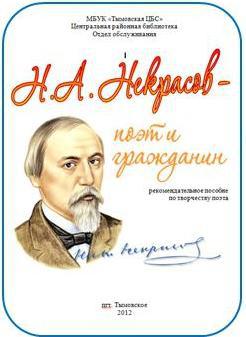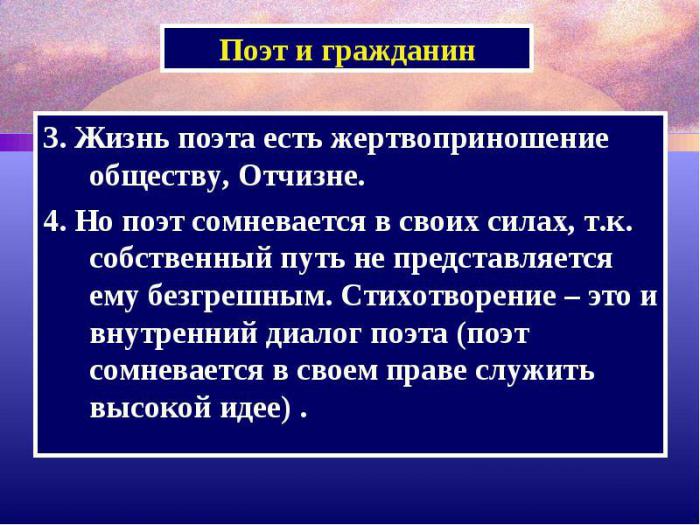The work of N. A. Nekrasov is a bright and interesting page in Russian classical literature. Continuing and enriching the ideas and paths outlined by Pushkin and Lermontov, Nekrasov stepped far forward in the development of those democratic ideals, patriotic views and trends that were declared in the work of his great predecessors. Muse of Nikolai Alekseevich - “the muse of anger and sorrow”, the sister of a peasant woman beaten by a whip on Sennaya. All his life he wrote about the people and for the people, and “home-friendly” Russia - impoverished, destitute and beautiful - appears before us from the pages of his poem collections as living.
History of creation
An analysis of the poem "The Poet and the Citizen", like any other work of art, should begin with a study of the history of its creation, with the socio-political situation that developed in the country at that time, and the author’s biographical data, if they are somehow related to the work . Date of writing of the text - 1855 - June 1856. It was first published in the author's collection, published in the same 56th. Prior to this, Chernyshevsky announced the Nekrasov book, having published in the next issue of Sovremennik a short review and analysis of the poem Poet and Citizen and its text, as well as several more vivid and nekrasovskoy biting works, including the bitter satire “Forgotten Village”.

Publications aroused great resonance in society and a sharp discontent of the authorities and official criticism. In The Poet and the Citizen, the autocratic government saw (quite rightly, by the way) harsh criticism and subversive, revolutionary calls. The entire issue of Sovremennik, as well as the circulation of the book, were removed from public access and banned from reprinting. A threat of closure loomed over the magazine itself. And over Nekrasov, who was at that time abroad, there was a threat of arrest upon his return. Why was the reaction of the authorities and censorship so violent? To understand this will help the analysis of the poem "The Poet and the Citizen."
Literary traditions and continuity
When rumors reached Nekrasov about government atrocities in the fields of culture, public opinion, literature, he replied that Russian writers saw "censorship storms and more terrible." And democratic values, civic consciousness and a sense of responsibility of a creative person to society, country, time and his own talent are taken over by Nekrasov from his older brothers and sisters - Pushkin (just remember his famous “Conversation of a book seller with a poet”) and Lermontov (“Journalist, reader and writer "). The analysis of the poem “The Poet and the Citizen” makes it possible to trace how much great poetic traditions Alexey Nikolaevich developed and deepened.
Pure Art and the Democratic Line
50-60s The 19th century is an extremely stressful time for Russia. Despite the reaction, police oppression and autocratic censorship, dissatisfaction with the political climate is growing in the country, and self-awareness of progressive layers of the population is growing.
Serfdom is bursting at all seams, ideas of popular liberation, anger and revenge are in the air. At this time, intense debate is taking place among representatives of the creative intelligentsia. "The poet and citizen" - a verse by Nekrasov - clearly reflects their essence. Representatives of the so-called "pure art" (the Poet leads the dispute in the work) believe that poetry, literature, as well as music, painting should talk about the "eternal". That real art is above socio-political problems and
daily bread. As an example of such a position, Nekrasov gives a quote from Pushkin's work (“Poet and Citizen”, verse “We were born for inspiration / For the sounds of sweets and prayers ...”). An ardent opponent of this point of view and a defender of
an active life position in art appears in the poem Citizen. It reflects the views and ideas of the author himself, democratic trends and aspirations.
Theme and idea of the poem
Nekrasov never divided his poetry into a purely lyrical, intimate, and civil. These two areas, it would seem, are completely different, harmoniously combined in his work in one common stream. “Poet and Citizen” (analysis of the poem proves this statement) is a programmatic work in the sense that it reveals the most important concepts for the author, touches on burning issues.

Nekrasov clearly and openly expressed his creative and socio-political credo: it does not matter who you are by profession and belief. It is important that you are the son of your country, and therefore, a citizen who is obliged to fight for it, for a better life, prosperity, both economic and spiritual. Unfortunately, very few agree with him. Therefore, the Citizen bitterly exclaims: “He will rebuke good hearts / By whom the motherland is holy.” In the "year of grief and sorrow", talented, honest, educated people do not have the right to sit aside, sing the "beauty of nature" and "sweet affection". Artists, especially writers, are endowed with a special gift - to influence the minds and hearts of people, to lead them along - a feat. To fulfill his duty, to give himself to serve the homeland and the people - this sees the purpose of the creative person of the Nekrasov. The “Poet and Citizen,” which we are analyzing, is a poem-manifesto, a poem-appeal, openly urging all fellow writers to stand on the side of the people: “There will be no worthy citizen / He is cold in soul / He’s no worse than reproach ...” .
The composition of the work and stylistic features
So, the theme of the poem is poet and poetry, their role in the socio-political movement of the country. The main idea and the main idea are expressed in the following lines: “Be a citizen ... / Live for the good of your neighbor ...”. To express it more clearly and more clearly, to bring it to readers more clearly, Nekrasov chooses the original form for the lyrical
works - dramatic dialogue, ideological debate. The replicas of the heroes are interspersed with the passionate monologues of the Citizen, full of
rhetorical addresses and exclamations, making his speeches extremely emotional. At the same time, the Poet is conducting his
internal dialogue. A large number of imperative verbs, socio-political vocabulary, invocative intonations create the very active and effective mood among readers, which Nekrasov aspires to. “Poet and Citizen” is a poem which he fully managed to prove to the masters of the word that their task is not “graceful literature” and the delight of the hearing of its lovers, not idle talk, but service to the people. The work in question has not lost its relevance in our days.